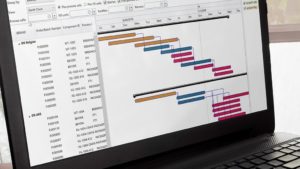
Two Roadblocks Process Manufacturers Will Discover With Microsoft Dynamics 365 Business Central Manufacturing
I think Microsoft Dynamics 365 Business Central is a great product, but not for ALL types of manufacturers.
One of the biggest challenges we run into is that a well-meaning reseller will recommend Dynamics 365 Business Central manufacturing because it is highly customizable. They assume that they can customize it to fit the unique needs of batch or process manufacturing.
Like most ERP systems, Dynamics 365 Business Central manufacturing is built for discrete manufacturing. If you have not worked with other kinds of manufacturing, you just don’t realize how different it is. To be honest, most small manufacturers don’t even realize how unique their own processes are. To them, “this is just the way everybody does it, right?”
Read: What is the difference between discrete, process and batch manufacturing?
Because of the way Microsoft Dynamics 365 is priced, the manufacturing piece is often included with no additional cost. So it seems to make sense to just “make it fit.”
However, once you start taking note of things that need to be customized to make Dynamics 365 Business Central fit process manufacturing specifically, you will realize it is a long list. A long list is an expensive list.
Remember, just because a system CAN be customized does not mean it should be. The more a system is customized, the harder it is to upgrade.
Read: 8 Software features you must have if you use a formula or recipe for manufacturing
The cost of customization is a speedbump. Even worse are the roadblocks, especially when you do not realize they are coming.
There are certain functions common to process manufacturing that Business Central simply can not do. No amount of programming is going to change that. Two examples are multiple facilities and yield analysis.

Roadblock 1 – Multiple Facilities
It is common for process or batch manufacturers to make the same product at multiple locations. For example, Sierra Nevada Brewing will use one formula to produce their Pale Ale beer in the North Carolina facility. However, the water chemistry is different at their California facility, so they use a different formula so the taste to the consumer will be exactly the same. In their software, they need to be able to set up a production facility, which is different from the main site. The production location makes the same SKU but uses a different formula. The same finished good can have two different SKUs based on the facility.
Microsoft Dynamics 365 Business Central Premium, which includes manufacturing functionality, does NOT support multiple facilities and does not allow manufacturers to make the same product at different locations.
Roadblock 2 – Yield Analysis
Yield analysis is a great example. Microsoft Dynamics 365 Business Central Manufacturing is built for a model that uses repetitive assembly. You make the same item the same way every time. There’s nothing wrong with that. There are a lot of companies out there that do that. When you start back-flushing, the software says, “You made 100 of these products. That means you must have used a fixed amount of the components.” It is all very fixed and organized. But that doesn’t work in our world of batch manufacturing.

What will happen is that your raw material and inventory control will get out of whack because the bill of material said you used 100 components, but you actually used 120 or 90. All of a sudden, that back-flush takes that variable yield and pushes it into inventory. Now, before you know it, you don’t know what you have, and you don’t know why. That linkage between what was supposed to be used and what was actually used can be really significant depending on the industry.
Many clients make multiple end items from a batch. Dynamics 365 Business Central has to split that into multiple work orders. One will have a standard loss, and the second will have that variance.
Going back to the brewery example, assume you have a tank of 100 gallons of beer. You should get 42 gallons in kegs and 57 gallons in cans. Instead, you output 40 gallons in kegs and 55 gallons in cans. Dynamics 365 Business Central would create two work orders and consume 42 gallons in kegs and have to apply 58 gallons to cans or keep a gallon in inventory.
The issue is that the system needs to be able to record multiple output streams from one input stream (holding tank).
These are just two examples of functions that process manufacturers need that Microsoft Dynamics 365 Business Central Manufacturing simply can’t provide at this time.
It is worth noting that Microsoft Dynamics GP Manufacturing also can not handle these functions. I chose to focus on Dynamics 365 Business Central as it is the “new and improved” product on the market, and people tend to think it can do everything. While it may appear that way, when you truly know process manufacturing the way that we do, you know that there is a better way.
A Better Fit for Process Manufacturers
Microsoft Dynamics 365 Business Central (and Microsoft Dynamics GP) is a great fit for process manufacturers when it is paired up with Vicinity Software.

Business Central focuses on what it does well, the entire financial/distribution/operational side of the business. And Vicinity Software handles the manufacturing side.
Many companies evaluating Business Central see that it has a manufacturing model and figure that will be enough for them. However, the problem could really show itself a few years down the line when they realize they have gone down into a pigeonhole of huge customizations.
And an ugly industry truth is that there can be a conflict of interest when a reseller is suggesting customizations. There are some cases where a customer is simply sent down the wrong path for the long term because there is more money in customizations than there is in the actual software.
If you are a manufacturing company that uses a formula or recipe in your process, I encourage you to talk to us before you select any ERP software.
We will show you the potential roadblocks in advance so you can stay on the path to success. Contact us online or call 770.421.2467.
By Randy Smith, CEO and Co-Founder, Vicinity Software, www.vicinitysoftware.com

Other articles you might like:
Compare discrete manufacturing versus process and batch manufacturing – Part 1
